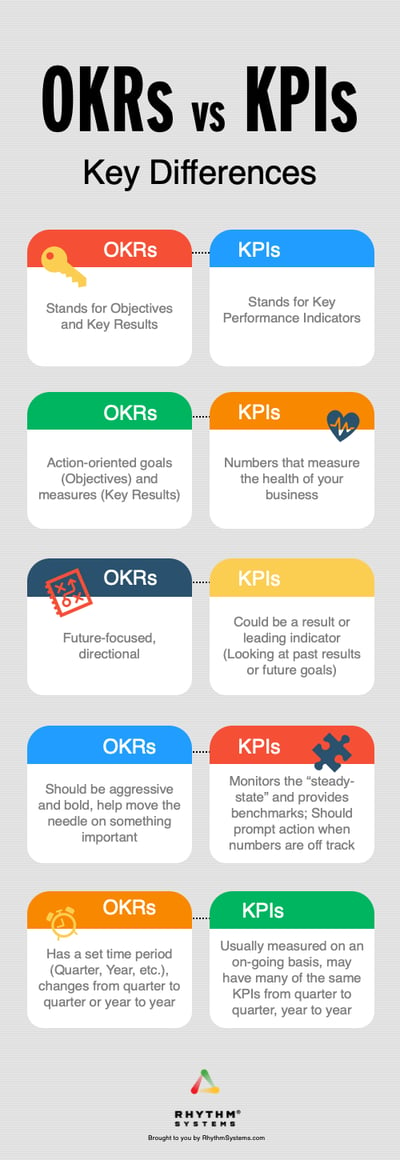As a training and on-boarding expert  at Rhythm Systems, I know a lot about KPIs. Recently, I’ve also learned a lot about OKRs. Many of my newer clients have come to us for a systematic way to implement their OKRs. As I help these clients map their goals into our Rhythm strategy execution software, I've been thinking a lot about whether the KPIs I know and love have a place in this world of Objectives and Key Results. I've concluded that while KPIs and OKRs are different, there's a clear benefit to having both. They are both instrumental in goal setting and performance management.
at Rhythm Systems, I know a lot about KPIs. Recently, I’ve also learned a lot about OKRs. Many of my newer clients have come to us for a systematic way to implement their OKRs. As I help these clients map their goals into our Rhythm strategy execution software, I've been thinking a lot about whether the KPIs I know and love have a place in this world of Objectives and Key Results. I've concluded that while KPIs and OKRs are different, there's a clear benefit to having both. They are both instrumental in goal setting and performance management.
The blog titled "OKRs vs KPIs: How To Use Both In Your Business" explains the differences between OKRs and KPIs and how each should be used to guide a business effectively. Objectives and Key Results (OKRs) are objectives a business sets that have any number of associated key results with the particular objective. In contrast, Key Performance Indicators (KPIs) are metrics that measure progress towards an objective or goal. While they can both be used in tandem to track a business's performance, they serve different purposes. OKRs provide a framework for setting goals and measuring progress in terms of achieving those goals, while KPIs help identify areas of improvement by providing data-driven insights into what is working and what isn't.
To successfully use both OKRs and KPIs in a business environment, it is important to understand the purpose of each tool. Setting clear and measurable objectives with corresponding key results will help ensure the desired outcomes are attainable. Tracking appropriate KPIs related to those objectives will help increase chances of success. Additionally, businesses need to ensure adequate time allotted for employees to meet all established objectives and room within their budget for any necessary resources required for meeting these objectives.
By understanding how OKRs and KPIs can complement each other in guiding business initiatives, organizations can maximize their potential for increased profitability and growth and foster an innovative company culture based on measurable successes.There is no need to choose between KPIs and OKRs. They complement each other, and both are well-needed tools in your performance management system and can be part of your balanced scorecard.
OKRs vs KPIs
What's the difference?
| OKRs | KPIs |
| Stands for Objectives and Key Results | Stands for Key Performance Indicator |
| Action-oriented goals (objectives) and measures (key results) | Number (metrics) that measure the health of your business |
| Future focused and directional, trying to get from point A to point B | Could be a result or leading indicator (Looking at past results or future goals/targets) |
| Should be aggressive and bold, help move the needle on something strategically important to your organization | Monitors the "steady-state" and provides benchmarks; Should prompt actions when the numbers are off track |
| Have a set time period (quarter, year, etc.), and changes from quarter to quarter or year to year as you progress | Usually measured on an on-going basis, it may have many of the same KPIs from quarter to quarter and year to year, but the targets might change |
Feel free to download our OKR vs KPI infographic 
To paint a clear picture of the difference, Felipe Castro uses an analogy of a road trip in his Medium post on this topic. For a road trip, first, you need to know where you are going (this is your Strategy), then you need the directions to get there (these are your OKRs), and finally, you need to know if your car has fuel and tires have air to get there (these are the KPIs that monitor the overall health of the business.) Before you create an OKR, make sure that you have clearly defined your objective and how you will measure how successfully it was accomplished.
How to Use KPIs and OKRs Together:
This helps to see how you can use KPIs and OKRs together. You may have a set of monitoring KPIs that you will always track just to know how healthy your business is, whether or not they are tied to any specific goals or OKRs for the year or the quarter. For example, you’ll always want to keep a finger on the pulse of financial indicators like revenue or profitability. You may also have key metrics around employee health or customer retention that will always be on your dashboard.
Some of your KPIs may also naturally become Key Results for your OKRs. If you have an objective around improving your website's performance to generate X more qualified leads, and you are already tracking the number of qualified leads as a KPI in your marketing team, this KPI becomes a Key Result for the objective for the quarter. Just remember that OKR stands for Objectives and Key Results, while KPI stands for Key Performance Indicator, and this should help you sort them out. Remember that the best practice is to use OKRS and KPIs in your goal setting. Read this blog post on how to write goals or check out the manager's guide to goal setting.
What KPIs and OKRs have in Common:
- Both should be specific, clear, and measurable. We recommend using Red-Yellow-Green success criteria for every key result and performance indicator.
- You should focus on a few of each that are truly key. Both acronyms contain the letter K for key - which means both require you to make choices to focus on a few things that are most important. You should have 3-5 key results at a given time and no more than 8-12 KPIs.
- You can have OKRs and KPIs for the company, for departments or teams, or for specific roles, individuals, or projects.
- Both can help you run your business by aligning everyone around well-defined goals and clear measures of success.
- They can be set for an individual or a team, but even the team ones need an accountable owner for the results.
What goals are you using to run your business? Do you have an effective way to maintain your company's health while also stimulating growth and progress? If you'd like more information on how to use metrics to drive accountable team performance, check out MBOs, KPIs, OKRs and What the Best Goals Have in Common.
Looking for some additional OKR examples to help get you started?
OKR Spreadsheets: Why You Should Upgrade Your OKR Software Game
OKR vs KPI vs MBO: What the Best Goal Types Have in Common
Using OKRs for Your Weekly Team Meeting
OKR Video: How to Get Started with OKRs and the Best OKR Software
OKR Examples for Manufacturing: Measure What Matters for the Quarter
Using Red Yellow Green Performance Indicators Examples That Are SMART
OKR Goal Setting Steps: 5 Keys to Drive Better Results
SMART Goal Setting Theory: To Create SMART Goals, Start With “Why”
Photo Credit: iStock by Getty Images




